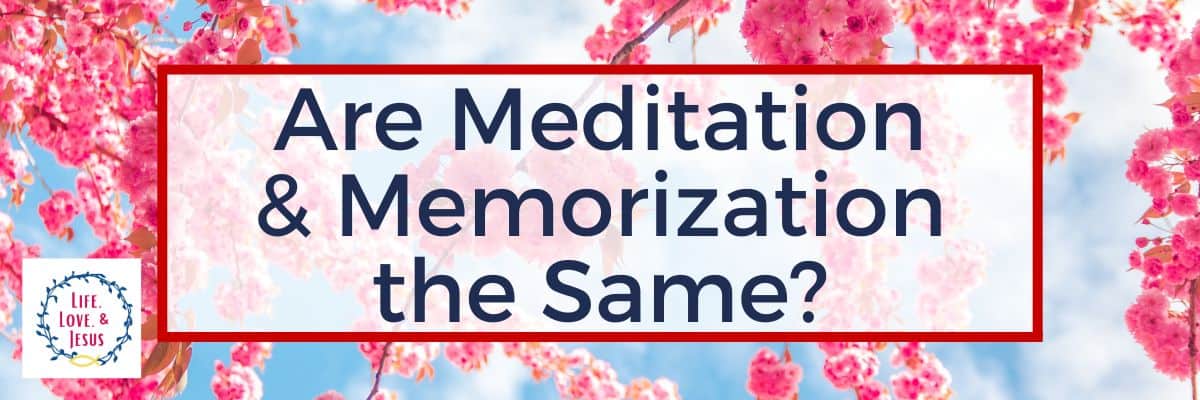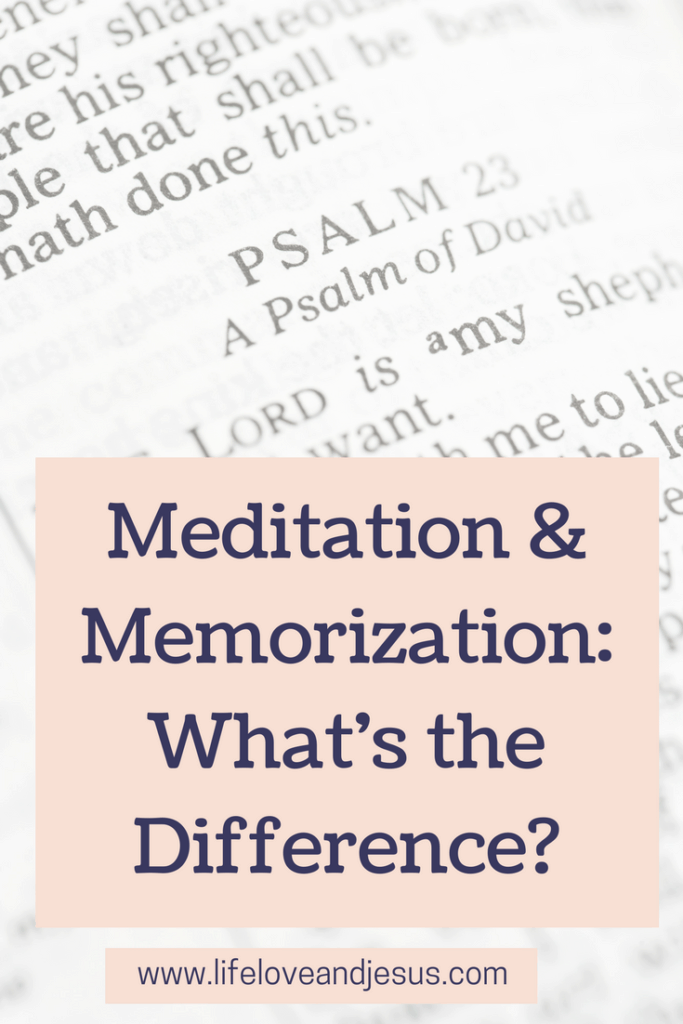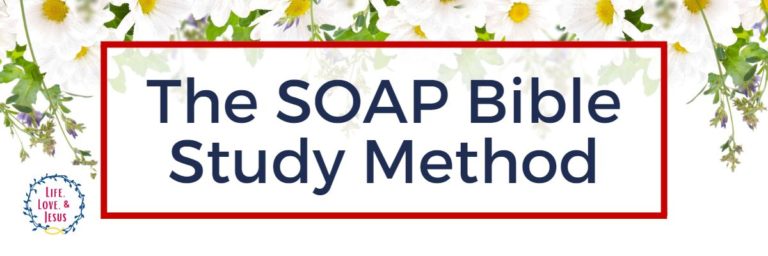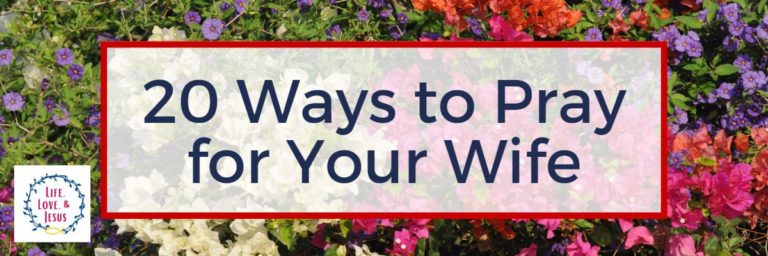Meditation and Memorization | What’s the Difference?
This post contains affiliate links. If you click & make a purchase, I receive a commission! Thanks! Read my full disclosure policy. As an Amazon Associate, I earn from qualifying purchases.
I grew up as a Catholic, so when I became a Christian at the age of 17, I didn’t have many ideas about what I should do – what things Christians do – other than go to church. But there was no shortage of people who were willing to tell me what to do.
- Study the Bible.
- Read the Bible.
- Pray
- Attend church Sunday morning, Sunday evening, and Wednesday evening.
- Memorize Bible verses.
- Meditate on the verses you memorize.
- Don’t drink, don’t smoke, don’t do drugs.
- And so on.
So, I – like the good student I was – did those things, as best as I could.

- I read and studied the Bible.
- I learned about prayer and prayed.
- I went to church every time the doors were open.
- I memorized verses.
- I didn’t drink, smoke, or do drugs.
Did you see what I skipped? Meditate. That one was a head-scratcher for me. What is meditating? Why should I do it? How do I do it? How is it different from memorizing Scripture? With a little bit of time on my side (OK – maybe a lot, but who’s counting?), I’ve worked out a few answers to these questions.
What is meditating?
According to the dictionary, meditate means to think deeply about or focus one’s thoughts on a topic. Some synonyms are contemplate, ruminate, ponder, muse, and reflect. In plain terms, it means to run something through your mind, over and over again.

In the Bible, it means pretty much the same thing. I won’t bore you with the details, but the two primary words translated meditate or meditation in the Bible, have roots that mean ponder, consider, utter, mutter, groan, muse, or complain. The ideas conveyed here are that some deep thinking and/or some out loud talking is taking place. In other words, meditation was not just an inward act of contemplation, but often an outward act of actually talking to oneself to cement an idea in the mind.
How is meditating on Scripture different from memorizing Scripture?
Memorizing Scripture has one purpose: to fix the verse or passage so firmly in your mind that you can recall it whenever needed. Meditation on Scripture has a different purpose: to fix the verse or passage so firmly in your heart that you can rely on its truth whenever needed. The thing is, meditating on Scripture is hard to do without memorizing it; and memorizing it is a poor substitute for meditating on it.
I have memorized a lot of Scripture. I attended a one-year Bible institute that required weekly verse/passage memorization, as well as memorizing an entire epistle over the summer. I don’t regret that time and effort but will admit that I do not find memorizing as easy to do now as when I was younger. I still try and think that every believer should try as well. But it isn’t the same as meditating on Scripture. Yes, you can memorize and not meditate and you can meditate and not memorize, but the two really are two sides of the same coin.
How do you meditate?
Look back at the definition: think deeply about or focus your thoughts on the passage. Let me show you – as much as I can – how this would work using Psalm 23:1: The LORD is my shepherd, I shall not want.
Focus on the first two words: The LORD. The Creator of the universe. The Almighty. The One who parted the Red Sea, fed the Israelites with manna, caused water to gush from a rock, and felled the walls of Jericho. This God is the One God who can do anything. He is my shepherd.
Next focus on the word my. He is my shepherd. Not just the shepherd for the Israelites of ancient days, He is mine. Not just the shepherd for those in desperate need, He is mine. Not just for the Bible teachers, the book authors, the pastors, the musicians, the worship leaders; He is mine.
Now focus on the word shepherd. One who leads those who do not know where to go. One who provides a source of food and water for the hungry and thirsty. One who protects from dangers. One who delights in, guards, guides, and loves His sheep. The God of the universe is all this to me. He is my shepherd.
Finally, focus on the words not want. Because this God of the universe who loves me intimately and personally is my Shepherd, I shall have no lack of any good thing. Does this mean that in this life, everything will be peachy? No, obviously not – there are too many believers whose lives are not great, too many who have been martyred for the faith – to believe such a thing. But it does mean that I will never lack for anything that is essential – not for life, but for living a godly life. I have been given everything I need to live a life that pleases the Shepherd, because the Shepherd cares for me.
Focus on each word or phrase in turn, and allow the Spirit of God to teach you – that is meditating.
Why should I meditate?
Here a just a few reasons to meditate on the Word:
- To know the Word more thoroughly and intimately (Psalm 119)
- To remember God’s works (Psalm 77:12)
- To remember God’s love (Psalm 48:9)
- To know God more (Psalm 63:6)
- To be fruitful (Joshua 1:8; John 15:1-11)
- To have deep roots (Colossians 2:6, 7)
- To be well-watered in the Word (Psalm 1:3)
Where to start with meditation?
Start with verses you already know – especially if you know them so well they’ve become more like white noise that God-breathed truth. Verses like John 3:16.
Then move on to verses that speak to you where you are at right now. Are you a stay at home mom, with toddlers underfoot? Meditate on verses about the peace God provides even in the midst of the storm. Are you an empty nester with time on your hands? Meditate on verses that speak to using your time wisely. Are you a work outside the home mom who never feels like she’s good enough? Meditate on verses about the overwhelming love of God.
Whatever your need, you can use an online Bible (www.biblestudytools.com, www.biblegateway.com are two good sites) to look up verses on specific topics that will speak to you. And as you meditate, try to memorize also. One helps the other. But if you have to choose, choose mediation.







I love this! Your story could almost be my story!! Grew up Catholic, ended up attending churches of other denominations and kind of unsure what to do with myself. I still remember the first time I remember hearing someone pray an off the cuff prayer. I was like, “wow, is that allowed?” As I’m getting older I’m learning the value in meditating on God’s Word. Makes such a difference!! Thanks for sharing!!
Thanks! It’s always encouraging to hear from people who have walked similar paths. Keep walking the narrow path!!